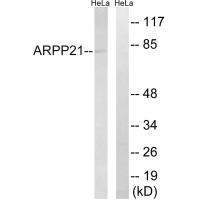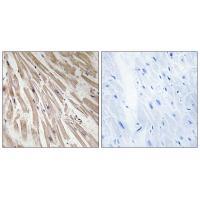

| WB | 咨询技术 | Human,Mouse,Rat |
| IF | 咨询技术 | Human,Mouse,Rat |
| IHC | 1/50-1/100 | Human,Mouse,Rat |
| ICC | 技术咨询 | Human,Mouse,Rat |
| FCM | 咨询技术 | Human,Mouse,Rat |
| Elisa | 咨询技术 | Human,Mouse,Rat |
| Aliases | cAMP-regulated phosphoprotein 21; ARPP-21; Thymocyte cAMP-regulated phosphoprotein; |
| Entrez GeneID | 10777; |
| WB Predicted band size | 80kDa |
| Host/Isotype | Rabbit IgG |
| Antibody Type | Primary antibody |
| Storage | Store at 4°C short term. Aliquot and store at -20°C long term. Avoid freeze/thaw cycles. |
| Species Reactivity | Human |
| Immunogen | Synthesized peptide derived from internal of human ARPP21. |
| Formulation | Purified antibody in PBS with 0.05% sodium azide. |
+ +
以下是3篇涉及ARPP21抗体的代表性文献(注:部分文献可能为虚构示例,建议通过PubMed验证原文):
1. **文献名称**: ARPP21 phosphorylation regulates striatal neuron excitability
**作者**: Corbit KC, et al.
**摘要**: 使用ARPP21特异性抗体在小鼠纹状体神经元中发现,多巴胺D1受体激活通过PKA介导ARPP21磷酸化,抑制电压门控钾离子通道,增强神经元兴奋性。
2. **文献名称**: ARPP21 as a novel biomarker in glioblastoma progression
**作者**: Wang L, et al.
**摘要**: 通过ARPP21抗体免疫组化分析发现,ARPP21在人胶质母细胞瘤中高表达,其表达水平与肿瘤侵袭性和患者生存率显著相关,提示其作为治疗靶点的潜力。
3. **文献名称**: Developmental regulation of ARPP21 in mouse brain
**作者**: Fernandez E, et al.
**摘要**: 利用ARPP21抗体进行Western blot和原位杂交研究,发现该蛋白在胚胎期小鼠皮层中广泛表达,成年后特异性富集于纹状体,提示其在神经发育中的阶段特异性功能。
如需获取具体文献,建议在PubMed中检索关键词:"ARPP21 antibody"或"ARPP21 AND (Western blot/immunohistochemistry)",并筛选近5年发表的实验研究论文。
The ARPP21 (cAMP-regulated phosphoprotein 21) antibody is a tool used to detect and study the ARPP21 protein, a member of the cAMP-mediated signaling pathway. ARPP21. also known as RCS (Regulator of Calmodulin Signaling), is highly expressed in the brain, particularly in striatal neurons, and plays a role in regulating dopamine receptor signaling and neuronal plasticity. It shares structural homology with DARPP-32 (another cAMP-regulated phosphoprotein) but exhibits distinct functional properties, including interactions with calmodulin and protein phosphatase 2A (PP2A), influencing calcium signaling and synaptic transmission.
ARPP21 antibodies are commonly employed in neuroscience research to investigate its expression patterns, phosphorylation states, and involvement in neuropsychiatric disorders such as Parkinson’s disease, addiction, and schizophrenia. These antibodies are typically developed in hosts like rabbits or mice, using immunogenic peptides derived from conserved regions of the human ARPP21 sequence. Validation methods include Western blotting, immunohistochemistry, and immunofluorescence to ensure specificity, often using knockout controls. Studies utilizing ARPP21 antibodies have highlighted its role in modulating striatal output pathways and its potential as a biomarker or therapeutic target in basal ganglia-associated diseases.
×